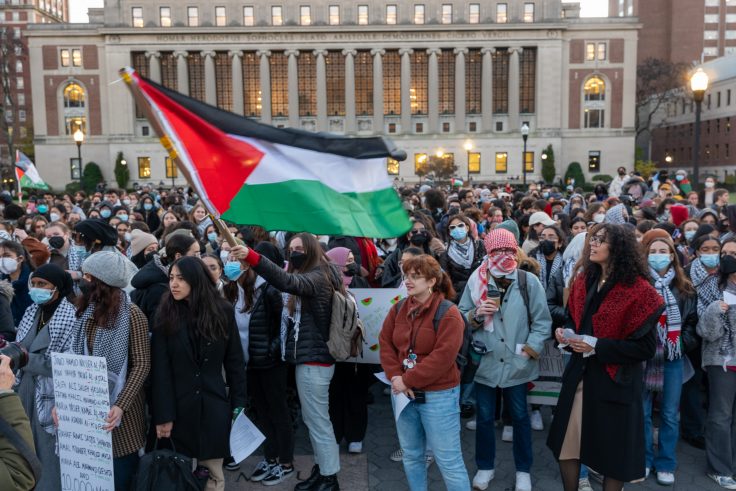Columbia found to have highest number of incidents among schools tracked

Anti-Semitic incidents on college campuses spiked 320 percent last year, with more than three-fourths of them in the wake of Hamas’s Oct. 7 terror attack on Israel, according to the Anti-Defamation League’s annual Audit of Antisemitic Incidents released Tuesday.
The report details a total of 8,873 incidents of assault, harassment, intimidation, and vandalism targeting Jews in 2023, representing a 140 percent increase from 2022. Among the nearly 9,000 incidents, 922 took place on college campuses—a 320 percent increase from the prior year. Seven hundred and thirty-two of them occurred between Oct. 7 and the end of 2023, representing a 1,062 percent increase compared with the same period in 2022, the report notes.
The ADL’s report says the group made efforts to avoid conflating anti-Israel activism with anti-Semitism, pointing out its record keeping comported with the International Holocaust Remembrance Alliance’s definition of anti-Semitism. Following Oct. 7, the ADL began counting certain anti-Zionist expressions that incorporated support for terrorism, called for attacks against Jews, or included classic anti-Semitic tropes. When the ADL removed incidents counted under its new post-Oct. 7 methodology, incidents on college campuses following Hamas’s attack still increased 478 percent from the same period the year prior, according to the group’s audit.
Among the 922 anti-Semitic incidents that took place on college campuses, 695 of them involved harassment, 215 involved vandalism, and 12 were assaults. These incidents were recorded at more than 300 universities across 43 states and the District of Columbia. Columbia University had the greatest number of recorded incidents with 17, followed by the University of Michigan, Stanford, Rutgers, and the University of Washington.
The report is the latest indication that universities have struggled to quell anti-Semitism on campus following Hamas’s Oct. 7 attack on Israel. During a now-infamous December congressional hearing, the presidents of Harvard, MIT, and the University of Pennsylvania struggled to explain why their schools were failing to crack down on anti-Semitism, despite previously taking a hardline approach to other forms of hate. Advocacy groups, lawmakers on both sides of the aisle, and the White House criticized the presidents’ responses. The presidents of Harvard and the University of Pennsylvania would later resign.
Columbia’s president, Nemat Shafik, will get an opportunity Wednesday to address the rise in anti-Semitism on her campus during a congressional hearing in front of the same lawmakers who grilled the presidents of Harvard, MIT, and the University of Pennsylvania in December.
“From President Shafik to every one of Columbia’s Deans, we have clearly and unequivocally condemned antisemitism. It has no place at Columbia,” a university spokeswoman told the Washington Free Beacon, adding the university has “taken swift and decisive actions to confront antisemitism.”
Last month, Columbia’s “Task Force on Antisemitism” released a report sharing concerns over “repeated violations of the rules on protests” and a failure by Columbia to enforce its rules. Jewish members of Columbia’s community have been targets of “racist epithets and graffiti, anti-Semitic tropes, and confrontational and unwelcome questions,” the report points out, all of which has allowed an environment of “isolation and pain” for Jewish students to flourish on campus.
Earlier this month, a Columbia University student group known for bringing anti-Semitic speakers to campus held an “unauthorized” protest in defiance of university directives. The university declared it would discipline the protesters but it is unclear how the administration followed through with that pledge.
The unauthorized protest followed the same student group’s platforming of anti-Semitic speakers, including a member of the Israeli-designated terror group Samidoun, who praised Hamas’s Oct. 7 terror attack, and Khaled Barakat, a Popular Front for the Liberation of Palestine activist, who praised airplane hijackings as “one of the most important tactics that the Palestinian resistance have engaged in.” Four students involved in the lecture were eventually suspended.
Original News Source – Washington Free Beacon
Running For Office? Conservative Campaign Management – Election Day Strategies!
